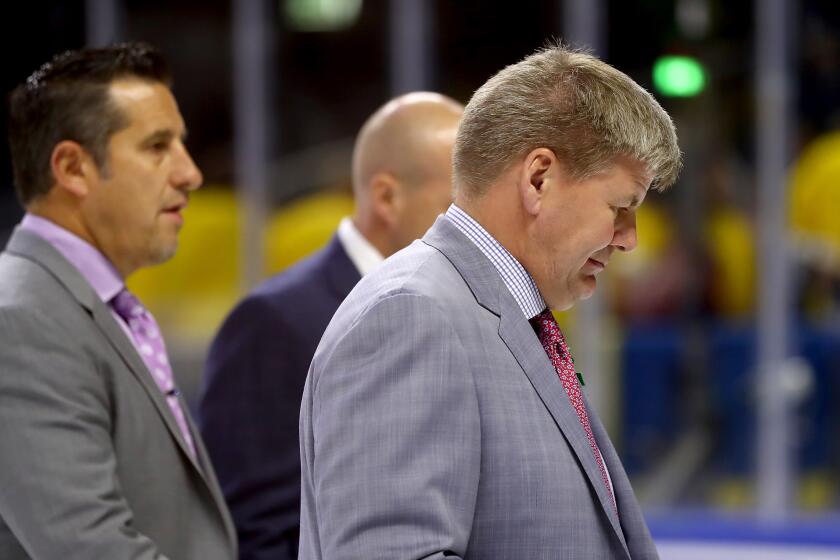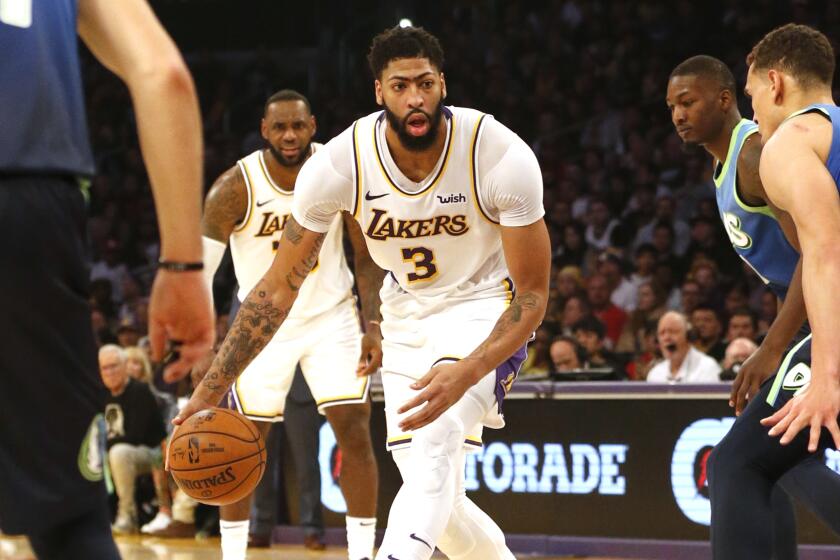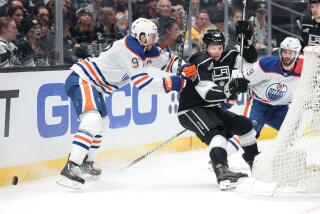Luc Robitaille makes the rounds to ensure Kings stay relevant in L.A.
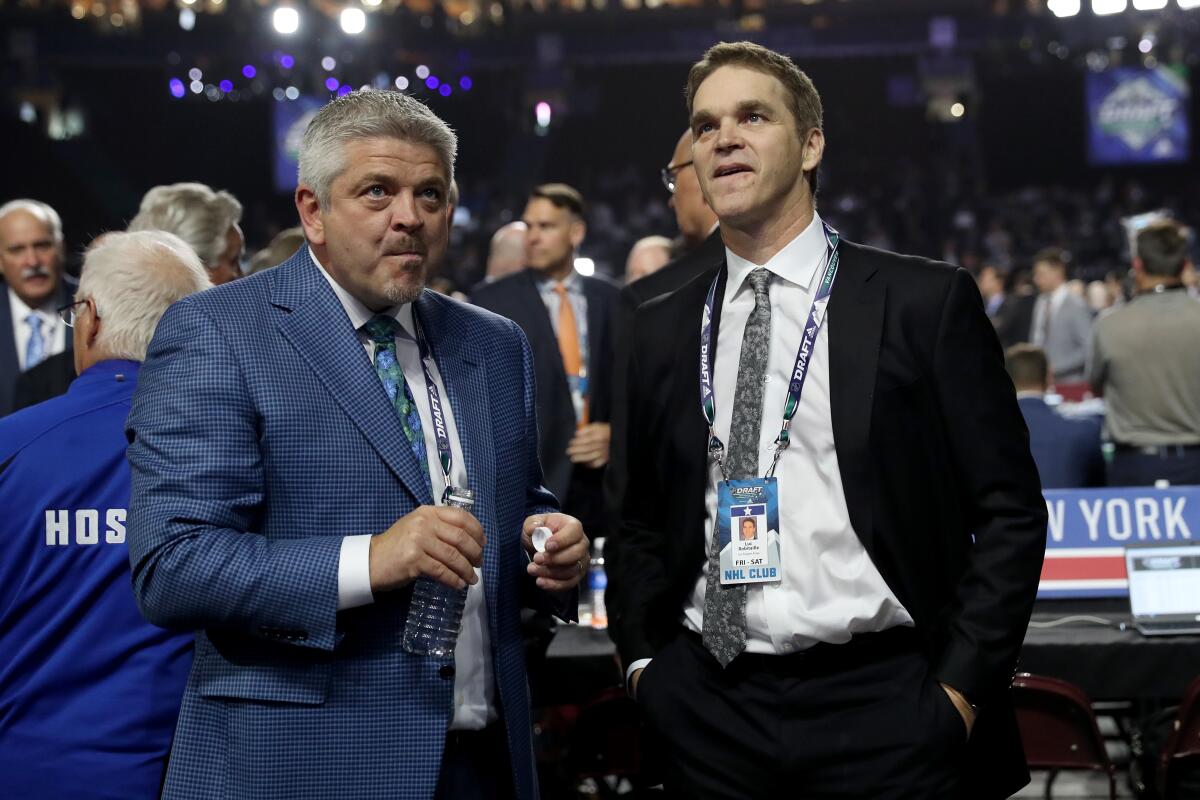
The most popular man in the Kings’ organization wears a trim gray coat and navy blue tie as he races around Staples Center.
It’s a recent Saturday afternoon. Puck drop is two hours away. Luc Robitaille has places to be.
The Hall of Fame player and third-year Kings president stands up from his table inside the arena’s Lexus Club before brunch is served. Once out the door, the handshakes and smiles come steadily.
Robitaille knows the waiters in this bright window-lit restaurant, the 50-50 raffle volunteer working the dimmed club level hallway outside, the elevator operator that shuttles him down to ice level, the team marketing staffer who has organized a pregame meet-and-greet with the local Black Girl Hockey Club.
From the Zamboni tunnel, Robitaille poses for pictures with youth players who recognize his face — from his in-arena video appearances, numerous on-camera commitments over the years, his arms-raised statue that sits front-and-center outside Staples Center — and parents who can recall his 1,077-game, 557-goal career.
Robitaille moves back upstairs, where season-ticket holders are supposed to be awaiting his arrival at an afternoon gathering inside the arena’s Golden Row bar. Only, right now, it’s empty. By accident, Robitaille has arrived early.
“We’ll come back later,” he says, making a quick note in the calendar app on his iPhone before uttering the most important lesson he’s learned over 27 years — 14 as a player and 10 as the president of business operations before his promotion in 2017 — with the Kings organization.
“It’s an important thing to do,” he says, “to try and touch as many people as possible.”
Anyone who resorts to physical or verbal abuse to convey a message is a coward and doesn’t deserve the honor of being called “coach.”
Through Robitaille’s eyes, this is what the Kings’ inevitable and unending battle for local relevancy looks like. He understands his franchise’s place in a frenzied Los Angeles sports market, that black and silver will never permanently paint over streaks of Dodger blue and Laker gold. That’s never been Robitaille’s goal, though, especially with the Kings’ post-championship rebuild overlapping with star-driven renaissances at pro franchises elsewhere in town.
“It’s just the way our city is,” Robitaille says, sipping a cup of coffee after returning to his brunch table. “To try and reach everyone in this town is almost a mistake. There’s 16 million people. There’s enough room for everyone. But you’ve got to work hard, because you know you’ve got to be relevant.”
So, during almost every home game, Robitaille follows this same routine, making the rounds to meet as many sponsors and fans as he can. He might not be able to make everyone a hockey fan. He just wants those who show up to want to come back. The rest of the organization follows his lead.
“The reason that Luc is good now is the same reason he was great as a terrible-skating, left-wing, ninth-round draft pick,” Kings Chief Operating Officer Kelly Cheeseman said, laughing. “It’s passion and drive that never takes a day off.”
Echoed Kings general manager Rob Blake, a former teammate of Robitaille’s: “He can walk into a room and everyone will get to know him by the end of the night. The passion is considerably the same.”
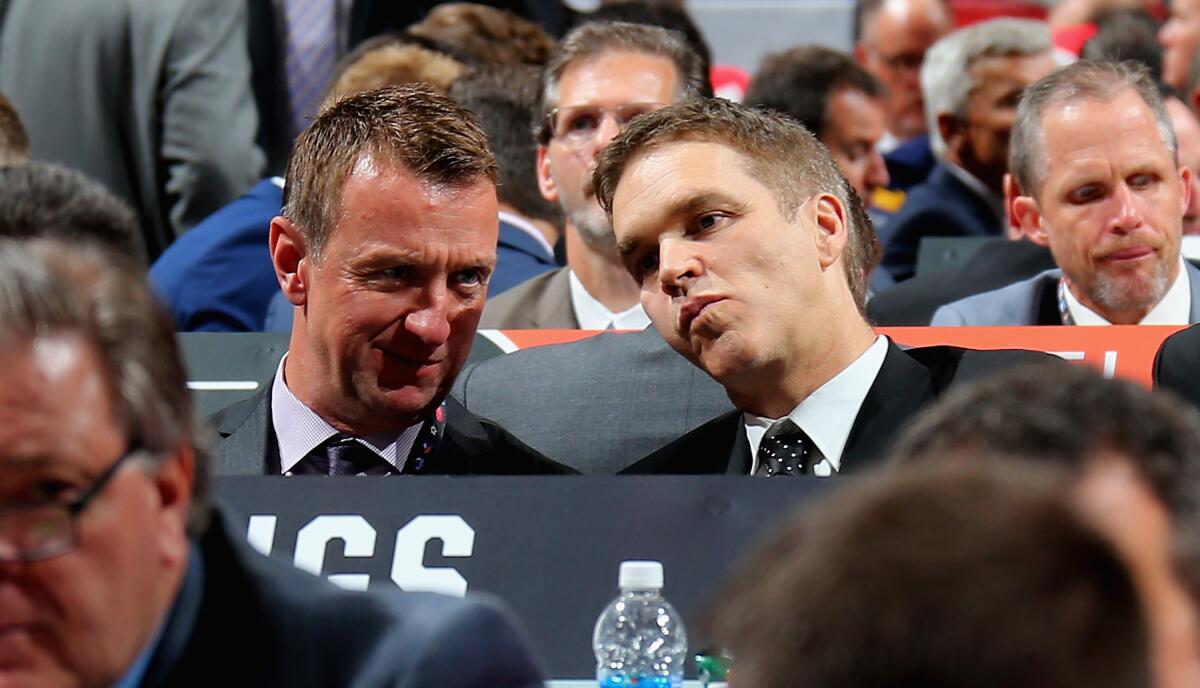
When Robitaille arrived in the Southland more than 30 years ago, he knew little about what was then the NHL’s Southernmost outpost. He feared he was walking into a hockey wasteland.
But by his third season in 1988-89, Wayne Gretzky had arrived. Suddenly, “we were averaging 13,000-14,000 per game, and saying ... this is pretty good,” Robitaille recalled. “There were some teams you’d see on TV and there’d be no one in the stands. A lot of people said, ‘This isn’t a good market.’ I found out, this is a good market, because they’d never won and they still almost sold out.”
Almost no one in the club is more involved in both the hockey and business sides of the operation than Robitaille, and fewer still are as cherished by the fan base. Any discussion about local relevancy, Robitaille says, has to start with them.
“We have to make sure they understand what we’re doing,” Robitaille says. “And then, when we’re doing good, that’s when everybody else comes on board.”
His pregame meal finished, Robitaille stops along the concourse for more fans to snap pictures, then heads up to AEG’s double-wide owner suite behind the net. From here, he can see it all. The play on the ice still elicits groans and guffaws from the man who was once only consumed with winning games. But now, he also scans all the action off of it. Winning over fans has become a top priority too, and he is constantly assessing the entertainment value that his club provides.
The Dallas Mavericks took advantage of all the Lakers mistakes and beat them, 114-100.
Today is the team’s first “Kids Day” of the season, and goalie Jonathan Quick’s daughter is introducing the lineup. There is laughter and applause. Robitaille smiles in approval. But it’s also an afternoon game (the Clippers have a game at Staples that night, a less-than-ideal reality of the three-team venue) and the stands are spotted with empty seats — the most tangible evidence of the Kings’ diminished prominence among the city’s sports scene.
Robitaille estimates that there are roughly 2.5 million hockey fans in and around Los Angeles, nearly 2 million of whom the franchise considers Kings fans. The team has 1.2 million followers on Twitter — more than both of L.A.’s NFL teams, the Angels and the Ducks. Decades of history laid the foundation for pro hockey in this part of the world.
But two Stanley Cup titles have turned winning into the baseline, not a bonus. As the Kings have languished near last place for most of the last two years, attendance has lessened. They had a seven-season sellout streak end in November 2018, and their current average crowd size of 16,783 is on-pace to be the lowest in a season since 2008-09.
They’ll end their most successful decade struggling to drum up interest amid the doldrums of a rebuild. So, Robitaille continues to be the embodiment of the Kings’ efforts to remain relevant — selling the team all over again to one fan at a time.
“Just trying to steal fans from the Lakers or Clippers is the wrong thing to do,” Robitaille says. “You’ve got to know in this town, you pay attention to what you’re doing, you pay attention to people who pay attention to you.”
More to Read
Go beyond the scoreboard
Get the latest on L.A.'s teams in the daily Sports Report newsletter.
You may occasionally receive promotional content from the Los Angeles Times.

